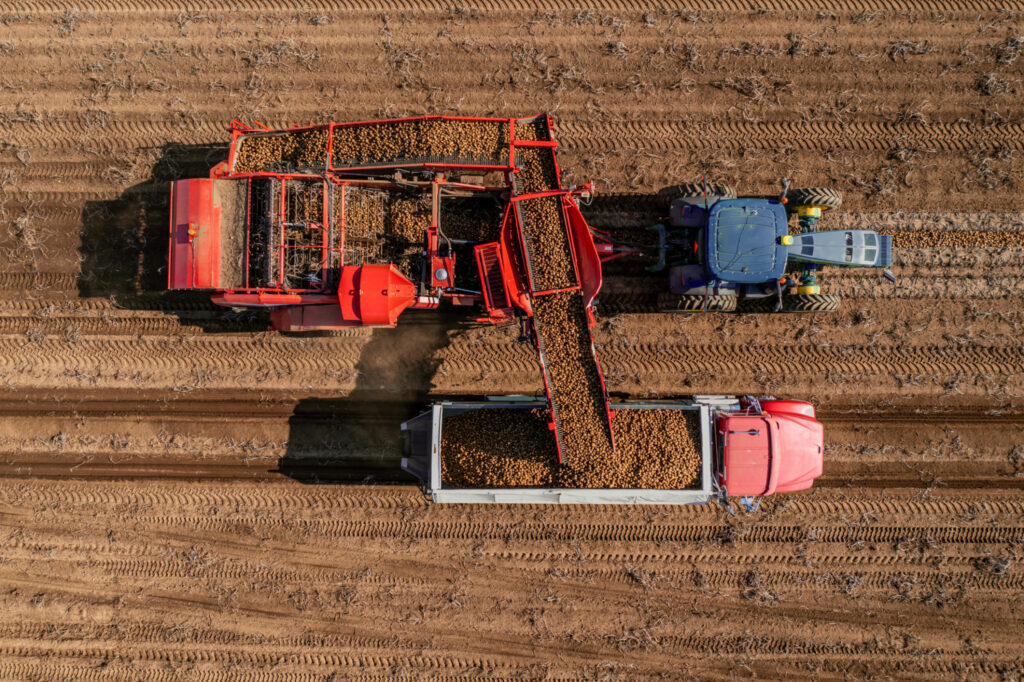PEI potato shipments to U.S. set to resume
The first potato shipments destined for the United States are expected to leave Prince Edward Island early this week following the lifting of a crippling four-month ban.
The U.S. Department of Agriculture issued its final order Friday, which cleared the way for imports of table-stock potatoes from P.E.I. to resume.
Canada stopped sending potatoes to the U.S. in November after potato wart fungus was detected in several fields on the Island last fall. Potato wart is an otherwise harmless disease that disfigures potatoes and reduces crop yields.

Potato wart first emerged in the island province in 2000, leading the industry to adopt a series of measures including trailer washing procedures since then.
The province’s potato industry is worth more than $1.3 billion annually, and the U.S. market typically represents $120 million of that, the P.E.I. Potato Board says.
In an interview, Greg Donald, general manager of the P.E.I. Potato Board, said Island farmers are happy to get the lucrative U.S. market back because demand is currently high.
“They’ll certainly be able to resume shipments as much as they can from now until the end of the storage season,” said Donald. “It will give the industry more certainty as they get close to planting season.”
However, seed potatoes, which account for about 10 per cent of the Island’s annual output, are still banned from the U.S. until the outcome of a more thorough review by American authorities. A Canadian ban meanwhile, also applies to seed potato shipments to other provinces.
“Unfortunately for the seed growers they’ve lost those markets for this spring, so that will definitely have a significant impact on them,” Donald said.
$50 million in lost revenue
The inability to send P.E.I.’s most valuable crop to markets elsewhere is figured to have cost the industry more than $50 million in revenue and forced farmers to destroy 250 million pounds of potatoes.
Donald said that’s money that will never be made up as farmers face additional challenges in re-establishing export markets.
Those challenges include a shortage of trucking to get product to market and an estimated 25 per cent increase in the cost of production during the upcoming planting season because of higher fertilizer, fuel and labour costs.
Planting will begin on some parts of the Island this month depending on the weather and usually begins “in earnest” during the first two weeks of May, Donald said.
He said he’s already aware of some growers who won’t plant because of the risk involved, although he couldn’t give hard numbers.
“I’m sure there will be many farms that will be cutting back as well, ” said Donald. “It’s going to be the most expensive crop they’ve ever planted this spring with huge (cost) increases.”
Hard decisions
One of the producers facing hard decisions is Alex Docherty, who runs Sky View Farms, in Cornwall, P.E.I.
A seed potato grower, Docherty said Sunday that his 400 acre operation usually sells most of its product in Ontario, with some going to other provinces including neighbouring New Brunswick.
“I was in my office today trying to figure out what I’m going to plant this spring and I still don’t know,” he said. “It’s the most baffling situation.”
Docherty added that it’s not as simple as temporarily switching to planting table-stock potatoes either.
“That’s cutting into the other guys’ market,” he said. “These markets are only so big.”
Docherty said it will be hard for Island seed growers to stay in business in the future because it will be difficult to sell to off-Island customers who are now “petrified” that they will be subject to inspection for potential potato wart.
“Most of my customers this year basically all cancelled in December,” he said.
Federal Agriculture Minister Marie-Claude Bibeau has said that seed potato shipments are unlikely to resume until 2023.
Donald said while he’s confident seed potato exports will resume next year, he and Island producers have mixed feelings about other markets returning now because it’s felt a ban wasn’t needed in the first place.
“We feel very strongly that it never should have happened,” he said.
- With files from TruckNews.com
Have your say
This is a moderated forum. Comments will no longer be published unless they are accompanied by a first and last name and a verifiable email address. (Today's Trucking will not publish or share the email address.) Profane language and content deemed to be libelous, racist, or threatening in nature will not be published under any circumstances.